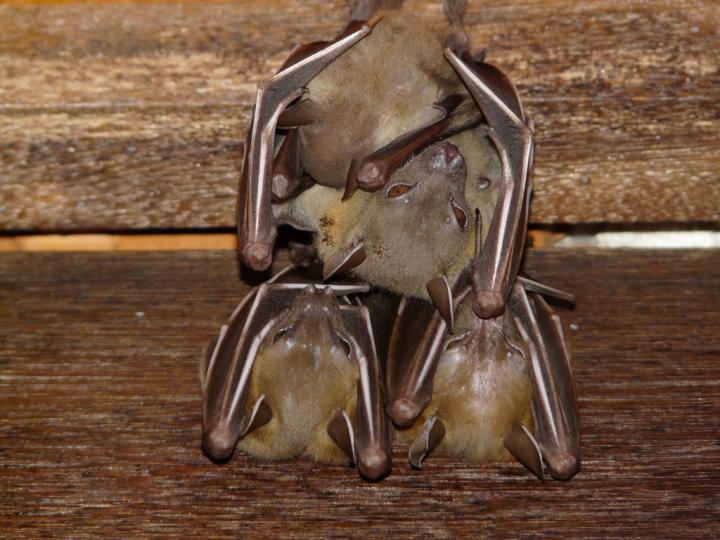Measures of genetic diversity of a fruit bat common in Singapore decreased 30-fold over the last 90 years

Credit: ©2013 Simon J. Tonge
A recent study by scientists from the National University of Singapore (NUS) revealed that the current biodiversity crisis may be much broader than widely assumed, and may affect even species thought to be common and tolerant of fragmentation and habitat loss.
Specifically, the research team found that the effective population size and genetic diversity of a common fruit bat species – the Sunda fruit bat (Cynopterus brachyotis) – that was believed to remain widely unaffected by urbanisation, has shrunk significantly over the last 90 years. By comparing historic DNA from museum samples collected in 1931 and modern samples collected in 2011 and 2012, the NUS team found a nearly 30-fold reduction in effective population size and corresponding levels of decline in genetic diversity estimates.
“This bat species carries a genomic signature of a steep breakdown in population-genetic diversity. The extreme bottleneck event that led to a reduction in genetic diversity happened some time in the early Anthropocene (around the 1940s) when humans’ impact on this planet became dominant,” explained first author Dr Balaji Chattopadhyay, who recently finished a postdoctoral fellowship at the NUS Department of Biological Sciences at the Faculty of Science.
Understanding the decline in population-genetic diversity of the Sunda fruit bat
An effective pollinator and seed disperser, Cynopterus brachyotis represents an important keystone bat species in Singapore’s ecosystem. This bat species is also widely distributed in human-dominated landscapes across tropical Southeast Asia.
In order to understand the effects of human-mediated changes such as urbanisation on the evolutionary trajectory of Singapore’s population of Cynopterus brachyotis, the NUS team reconstructed and compared diverse models of historic demography. The researchers sequenced and examined over 634 million DNA reads of Cynopterus brachyotis genome and generated multiple datasets for the study.
Their findings suggest that Singapore’s Cynopterus brachyotis population underwent a continuous decline that started approximately 195 generations ago (i.e. 1,600 years ago), and experienced a recent genetic bottleneck – or a sharp reduction in population size – nine generations ago, roughly in 1940. Genetic bottlenecks increase the vulnerability of a species to unpredictable events and can accelerate extinction of small populations. While bottlenecks following human interference have been documented in many endangered species, this study suggests that even common human commensals may not be immune to the effects of bottlenecks.
“Cynopterus brachyotis is a generalist fruit bat that tolerates urbanised settings. As such, it is an unlikely victim of habitat degradation and fragmentation. The unexpected loss in genetic diversity in this common species, largely due to urbanisation and human-mediated changes, indicates that the modern environmental crisis can generate adverse silent effects that only become apparent much later, when the impact of low genetic diversity may take hold in a population,” explained Assistant Professor Frank Rheindt from the NUS Department of Biological Sciences, leader of the laboratory group that conducted the study.
“This phenomenon has been characterised as extinction debt, when actual extinction occurs with a time lag, long after the critical damage was done. Hence, an increased understanding of baseline levels and rates of loss of genetic diversity across organismic groups like Cynopterus brachyotis bats and habitats may, in the future, become imperative for informed conservation action,” he added.
This research was conducted in collaboration with the National Parks Board (NParks) Singapore which supported the sampling of contemporaneous populations of the bats. The findings were published in the journal Current Biology on 16 December 2019.
“Our research also underscores the importance of strong museum collections facilitating the DNA-sampling of time series. More global support is needed for modern cryo-collections, which are generally under-funded,” said Asst Prof Rheindt.
Asst Prof Rheindt is looking to extend the research by investigating multiple other animal species in Singapore and Southeast Asia to better characterise extinction risk.
###
Media Contact
Amal Naquiah
[email protected]
65-651-65125
Original Source
http://news.
Related Journal Article
http://dx.




